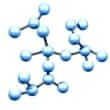Background
- It is claimed that krebiozen, originally called substance X, came from horses inoculated with Actinomyces bovis by Dr. Stevan Durovic. Durovic claimed that krebiozen had been useful in the treatment of spontaneous cancer, mainly in cats and dogs. It is unclear what kreboizin really contained; in some cases it was found to be creatine monohydrate and in other cases it contained mineral oil and l-methylhydantoin, a product of heating creatine monohydrate.
- Several studies have failed to show beneficial results from kreboizen. Reports published by the Krebiozen Foundation found improvement in cancer patients, but these results were disproven by the U.S. Food and Drug Administration (FDA) and the National Cancer Institute. Dr. Andrew Ivy (University of Illinois), Dr. Stevan Durovic, and Marko Durovic were brought to trial for violations of FDA regulations. There is currently no scientific proof that krebiozen is a viable treatment option for high blood pressure, cancer remission or any other condition.
References
- Anon. STATUS report on "krebiozen". J Am Med Assoc 1951;147(9):864-873.
View Abstract - Anon. Unproven methods of cancer management. Krebiozen and carcalon. CA Cancer J Clin 1973;23(2):111-115.
View Abstract - Beck M. [Remedies and quackeries]. Acta Pharm Hung 1999;69(1):5-8.
View Abstract - Holland JF. The krebiozen story. Is cancer quackery dead? JAMA 1967;200(3):213-218.
View Abstract - Jallut O, Guex P, Barrelet L. [Unproven methods in oncology]. Schweiz Med Wochenschr 1984;114(36):1214-1220.
View Abstract - Janssen WF. Cancer quackery--the past in the present. Semin Oncol 1979;6(4):526-536.
View Abstract - Langer E. The Krebiozen case: what happened in Chicago. Science 1966;151(714):1061-1064.
View Abstract - Stolinsky DC, Bateman JR. Recurrent masses at sites of prior Krebiozen (NSC-8752) injections. Cancer Chemother Rep 1974;58(2):249-250.
View Abstract







